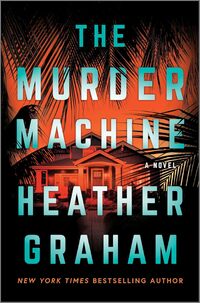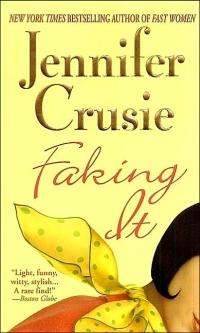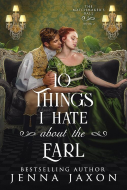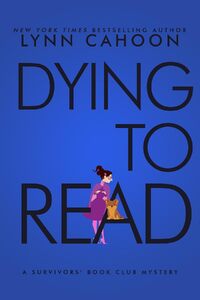 THE MURDER MACHINE |
 The books of May are here—fresh, fierce, and full of feels. |

Purchase
St. Martin's Press Romance Contemporary Excerpt of Faking It by Jennifer CrusieMatilda Goodnight stepped back from her latest mural and realized that of all the crimes she'd committed in her thirty-four years, painting the floor-to-ceiling reproduction of van Gogh's sunflowers on Clarissa Donnelly's dining room wall was the one that was going to send her to hell. God might forgive her the Botticelli Venus she'd painted in the bathroom in Iowa, the Uccello battle scene she'd done for the boardroom in New Jersey, even the Bosch orgy she'd painted in the bedroom in Utah, but these giant, glaring sunflowers were going to be His Last Straw. "I gave you a nice talent," He was going to say to her on Judgment Day, "and this is what you did with it." Tilda felt her lungs tighten and stuck her hand in her pocket to make sure she had her inhaler. Beside her, Clarissa wrapped her thin little arms around her size two chenille sweater and squinted at the brownish- yellow flowers. "It's just like his, isn't it?" "Yes," Tilda said with regret and handed her the museum print of the original. "The flowers look so ... angry," Clarissa said. "Well." Tilda closed her paint box. "He was nuts." Clarissa nodded. "I heard about that. The ear." "Yeah, that got a lot of press." Tilda shrugged off her paint shirt. "So I'll take my completion check—" "Did you sign it?" Clarissa said. "You need to sign it. I want everybody to know it's a real Matilda Veronica mural." "I signed it." Tilda pointed the toe of her paint-stained canvas shoe at the bottom where she'd scrawled "Matilda Veronica." "Right there. Now I have to be going—" "You didn't sign it `van Gogh,' did you?" Clarissa bent down. "Wouldn't that be forgery?" "Not unless he had a Kentucky mural period we don't know about." Tilda tried to take a deep breath. "So I'll take that check—" "Write your name bigger," Clarissa said, straightening. "I want everybody to know you painted this. I'm going to keep the magazine right here, too. So they know that it's a real Matilda Veronica—" Clarissa's enthusiasm for her as a brand name had lost its appeal many days before, so Tilda changed the subject. "Well, Spot was certainly a champ about the whole thing." She nodded at Clarissa's elongated little dog on the theory that people were always pleased when you talked about their animals. "His tail is almost hiding your name," Clarissa said. Tilda let her glasses slide down her nose a little and looked over the rims at Spot, quivering at her feet. She'd done some dog face-lifting in the mural since Spot's beady eyes almost met over his long knife-edged nose. She'd softened the gray that streaked his dark, shaggy coat, too, so he didn't look so much like a very small, mutant wolf. "You have to sign it again," Clarissa said. "Sign it up at the top. Bigger." "No," Tilda said. "Everyone will see it because they'll be comparing Spot to the painting. People always do that, look at the dog and then look at the painting—" "No they won't," Clarissa said, triumphant. "He goes back to the pound today." "You're taking your dog to the pound?" At Tilda's feet, Spot pressed against her, shedding on her jeans. "He's not my dog," Clarissa said. "You always put dogs in your murals—" "No I don't," Tilda said. "—it said so in the magazine, so I had to have one, too, or people wouldn't think it was a real Matilda Veronica, so I went and got the only purebred they had." "Spot's a purebred?" "Silver dapple, longhaired dachshund," Clarissa said. "He'll be fine back at the pound. He's used to it. I'm the third person who's adopted him." Tilda pulled out her inhaler and inhaled. It made sense when she thought about it. Clarissa was exactly the kind of woman who'd go to Rent-A-Dog and get a designer second for fake warmth in her faux Postimpressionist wall painting. Spot looked up at her now, shaking, almost as pathetic as he was ugly. I am not going to rescue you, Tilda thought, capping her inhaler. I can't save everybody, I'm asthmatic, and I don't want a dog, especially not one who acts like he snorts coke and looks like he rolls in it. "Sign it again up here," Clarissa said. "I'll get you a Sharpie." "No," Tilda said. "I signed it. It's done. And I'll take the completion check now, thank you." "Well, I don't know, that signature—" Clarissa began, and Tilda pushed her glasses up the bridge of her nose and turned steely eyes on her. Clarissa nodded. "I'll go get that check, then." Left alone with Spot—a hell of a name for a dog that had none—Tilda tried to think of something besides the pound. There was the mural, another success, another chunk of money off the family debt, another two weeks painted from her life by ripping off art history— Her cell phone rang and cut short her stab at optimism. Tilda flipped open the cover. "Hell-o." "Tilda," her mother said, "we have a problem." "Really," Tilda said, staring at the sunflowers. "Who'd have guessed?" "It's bad," Gwen said, and Tilda stopped, taken aback by the seriousness in her mother's voice. Gwennie did muffins and Double-Crostics, not serious. "Okay, so whatever it is, we'll fix it." She looked down at the dog again, and he gazed back at her, desperation in his eyes. "What is it?" "Nadine sold a Scarlet." Tilda jerked her head up as her stomach cramped. In the background on the phone, she heard her sixteen-year-old niece say, "I still don't get what I did wrong," and she went cold all over. "There aren't any Scarlets." Tilda tried to draw a deep breath while not throwing up. "Dad sold them all." "Not the first one," Gwen said. "Remember? He couldn't because it was of our building. Nadine found it in the basement. And the woman who bought it won't give it back. I asked." Clarissa came back with the check and Tilda took it. "Thank you," she said to Clarissa and then spoke into the phone. "Ask again." "I tried. She hung up on me and I called again and Mason Phipps answered. She's staying with him." Gwen's voice grew slower. "Mason was an old friend of your father's. He's the one who told her about Scarlet and the gallery. And he invited me to dinner tonight." "Oh, good. One of us will have a hearty meal." "So I thought I'd go and distract them and you could sneak in and steal it," Gwen said. "And then we can bury it in the basement again." Tilda turned away from Clarissa and whispered into the phone. "You do realize you don't get muffins in prison?" She tried again for a deep breath, fighting back the nausea. "And when we get it back, we're burning it. If I'd known it was down th—" "Something wrong?" Clarissa said from behind her. "No," Tilda said to her. "Everything is peachy." She spoke into the phone. "I'm coming home. I'll be there in four hours. Do not do anything until I get there." "We never do," Gwen said and hung up. "I certainly hope everything's okay," Clarissa said, looking avid. "Everything is always okay," Tilda said bitterly. "That's what I do. I make everything okay." She stuffed the check in her shirt pocket and looked down at Spot, trembling on her foot. "Which is why I'm taking your dog." "What?" Clarissa said, but Tilda had already scooped Spot up, his long body drooping over her arm while his feet tried for purchase on her hip. "Just saving you a trip to the pound," Tilda said. "Have a lovely day." She carted her paint box and the dog out to her beat-up yellow van, simmering with exasperation and another emotion she didn't quite recognize but thought might be fear. It put an acrid taste in her mouth, and she didn't like it. Once on the passenger seat, Spot simmered, too. "Oh, calm down," she said to him, as she put the van in gear. "Anything's better than jail." Spot looked at her strangely. "The pound. I meant the pound." She talked to him all the way home, and by the time she pulled into the fenced lot behind the Goodnight Gallery, Spot was asleep and she was calmer. When she shut off the motor, he jerked awake, his eyes like marbles, and she carried him, now heaving with anxiety, into the shabby gallery office and deposited him on the floor in front of her mother and niece, both of them looking blonde and blue-eyed and cute. So not like me, Tilda thought. Behind them, Gwennie's bubbler jukebox played "No, No, Not Again," by the Three Degrees. "This is Spot," she said to Gwen and Nadine. "I'm finding him a home where people will treat him with dignity and not sell him down the river while his back is turned." "Well, I'm sorry," Nadine said, her pretty face defiant under her mop of pale curls. She was wearing a black T- shirt that said BITE ME in Gothic letters, but she still looked like Shirley Temple in a snit. "Nobody told me we couldn't sell paintings. We're an art gallery, for cripe's sake." She crouched down on the worn Oriental rug to pet Spot, who backed away, still heaving, his eyes peeled for a getaway. "What is wrong with this dog?" "So many things," Tilda said. "About the painting?" "While you were in Iowa," Gwen said to her, "Nadine broke curfew and Andrew sent her down to clean the basement as a punishment." Tilda took a deep breath and thought of a few choice things to say to her ex-brother-in-law. "You can stop looking so mad," Nadine said "Dad didn't let me in the locked part. I still don't know what's in there." "Storage," Tilda said. "Right." Nadine rolled her eyes. "Nadine." Tilda pushed her glasses up the bridge of her nose and looked down at her, and Nadine swallowed and sat up a little straighter. "You are not in a position to push your luck here. The painting." "Dad made me clean the back storeroom," Nadine said. "It was full of furniture painted with animals. Dad said you did it when you were my age. It was pretty cool, especially the bed when we'd cleaned it off and set it up— " "We?" Tilda said. "Ethan and me," Nadine said. "You didn't think I cleaned that whole place out by myself?" "So Ethan knows." Tilda consigned Andrew to the lowest circle of hell for criminal stupidity, in sending not only his daughter down there but also her nonfamily best friend. "Well, he knows there's furniture down there, yeah," Nadine said. "What is it with you and the basement? It's furniture." "Right." Tilda realized her lungs were closing up again and got her inhaler out. "Are we close to the painting yet?" "It was in there," Nadine said. "It was wrapped in paper and stuck in a cabinet, the one with the turquoise monkeys on it. Did you really paint all those animals?" "It's junk. I was going through a phase." Tilda hit the inhaler. "So you pulled the painting out and then what?" "We thought it was good," Nadine said. "So you sold it," Tilda said. "No. We put it back in the cabinet and put dustsheets on everything and went to Cup O' Joe's. And then today, Grandma had to go to the bank, and this Mrs. Lewis came in and asked if we had any paintings by somebody named Scarlet, and I said no, all we had was Dorcas Finsters." Nadine turned to Gwen. "Are we ever going to get rid of those? I know she lives here, but they're really depressing, and I think we could—" "Nadine," Tilda said. "Okay." Nadine crossed her arms. "And Mrs. Lewis said no, she wanted paintings that looked like a kid had painted them, and she started talking about checkerboard skies and stars, and Ethan was here and he said, `That's like the one we found in your basement,' and she would not leave until we showed it to her." "Ethan said that," Tilda said. "Or maybe me." Nadine squinted at the ceiling. "I'm not sure. Ask Ethan." "Like Ethan wouldn't lie down on burning coals for you," Tilda said. "So you went and got the painting ..." "And she offered me a hundred dollars for it and I said no," Nadine said virtuously. "And yet, the painting is not here," Tilda said. "She kept offering and I kept saying no and when she got to a thousand I caved," Nadine said. "Now will somebody tell me why that was bad?" "No." Gwen sank down on the couch next to her granddaughter, looking much like Nadine was going to look in forty years, pale-eyed, graying, and gamine. "Where's your mom?" Tilda asked Nadine. She turned to Gwen. "Why wasn't Eve watching the gallery?" "She had a teacher's meeting," Gwen said. "Summer school. She's aiding again. Look, this Lewis woman is not going to return it. And the more fuss we make, the more suspicious we look." "Suspicious about what?" Nadine said. "Nobody tells me anything." She reached down and scooped Spot off the faded rug, and his tremors picked up again. "If you don't tell me stuff, you can't blame me when I screw up." She stuck her chin out at Tilda, defiant as she patted the dog, and Tilda thought, She's right. She pulled out the ancient desk chair so it was facing Nadine and sat down, wincing as it creaked. "Okay, here it is." "No," Gwen said. "She's sixteen." "Yeah, and how old was I?" Tilda said. "I can't remember a time I didn't know." "Hello?" Nadine waved. "I'm right here. Know what?" "Do you remember how successful the gallery used to be, when Grandpa ran it?" Tilda said. "No," Nadine said. "I was a kid when he died. I wasn't really into the gallery thing then." She relaxed her hold on Spot, who struggled out of her lap, hit the rug with a splat, and recovered by putting his paws up on Tilda. "Well, one of the reasons we were successful was that Grandpa sometimes sold fakes," Tilda said flatly. "Oh," Nadine said. "That's good," Gwen said, her hands gripped together in her lap. "The more people who know that the better." "I won't tell," Nadine said. "Some of the paintings that were real were by a man named Homer Hodge," Tilda plowed on, "and Grandpa made a lot of money off him legally. But then he and Homer had a fight, and Homer stopped sending him paintings, so your grandpa got the bright idea of inventing a daughter for Homer named Scarlet, and he sold five paintings by her, making a big deal out of the fact that she was a Hodge." Gwen slumped back against the couch and stared at the ceiling, shaking her head. "Invented a daughter?" Nadine said. "Cool." "No, not cool." Tilda picked up Spot, needing something to hold on to for the next part, and Spot sighed and curled his long, furry body to fit her lap. "The painting you sold was the first Scarlet, a fake painting by a fake artist. And that's fraud and we could go to jail. And people are going to realize it's a fake because Homer was from a farm in southern Ohio, and the painting you sold is of this building." "I thought it looked familiar," Nadine said. "So once they figure out that one's a fake, they're going to come back to the gallery and ask questions." Tilda felt her stomach twist again. "They might look at all the paintings Grandpa sold them for thousands of dollars and find out that some of them are fakes, and they're going to want their money back, and we don't have it. And we could go to jail for that, too, and lose the gallery and this whole building which means we'd all be out on the street." "Wait a minute," Nadine said, perking up, evidently undeterred by the news her grandpa was a crook and she might soon be living in the gutter. "I didn't know it was a fake. The only person who knew it was a fake was Grandpa. So we're off the hook. We can blame him. He's dead!" "That's been pretty much my plan for the past five years," Gwen said, still staring at the ceiling. "Nice try, but no," Tilda said, feeling sicker. "The gallery as a business is still liable. And there's one other person who knew and could go to jail. The person who painted them." "Oh." Nadine grew still. "Who painted them?" "I did, of course," Tilda said, and got out her inhaler again. IT HAD taken Davy Dempsey four days to track his ex- financial adviser from Miami, Florida, to Columbus, Ohio, and now he leaned in the doorway of a little diner and watched his prey pick up his water glass, survey the rim, and then wipe it with his napkin. Ronald Abbott, aka Rabbit, was born to be the perfect mark: pale, semichinless, and so smug about his superiority in all things having to do with money, art, and life in general that he was a sure thing to con. Which made it doubly annoying that he had taken all of Davy's money. Davy crossed the diner and slid into the booth, and Ronald looked up in mid-sip and then inhaled his water in one horrified gasp. "Hello, Rabbit," Davy said, enjoying the gargle. "Where the hell is my three million dollars?" Excerpt from Faking It by Jennifer Crusie |
|
| |||
|
||||



 © 2003-2025
© 2003-2025